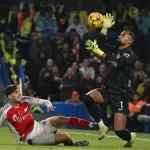LAGOS—An Ikeja Special Offences Court, Lagos, has admitted more documents in evidence against Ismaila Mustapha, the socialite better known as Mompha.
Mompha alongside Ismalob Global Investment Limited, his company, are facing an eight-count charge of conspiracy to launder funds obtained through unlawful activity, retention of proceeds of criminal conduct, laundering of funds obtained through unlawful activity, failure to disclose assets and property, possession of documents containing false pretence and use of property derived from an unlawful act.
At the resumed hearing in the matter, yesterday, the Economic and Financial Crimes Commission, EFCC, through its counsel, Suleiman Suleiman, presented two documents, including a letter by the commission to the United States of America’s Federal Bureau of Investigation, FBI, and an investigative report by the bureau.
The investigative report claimed Mompha’s iPhone was used for fraudulent practices.
The prosecution witness, Ayotunde Solademi, an FBI representative, said the bureau’s forensic operations revealed that Mompha’s iPhone was used to send account details to a United Arab Emirates, UAE, telephone number, search for swift codes of a bank, and had a compromised Microsoft 365 account.
The witness said: “The iPhone had a compromised Microsoft 365 account and attackers used a fraudulent domain to socially engineer communication to their (Mompha’s) company.”
He further told the court that the FBI discovered during analysis that Mompha’s iPhone was also used to change payment delivery from cheque to wire transfer.
“The iPhone was used to make three attempts to transfer funds. The first two failed, but the third was successful,” he added.
Under cross-examination, Kolawole Salami, counsel to Mompha, read from a paragraph of the documents which stated that the FBI documents were not to be used in a legal proceeding except after a separate communication has been made.
Responding, the witness said his presence in court to give evidence amounted to a separate communication from the FBI that allowed for the use of the documents in court.
The witness also admitted that he was not aware whether the FBI ever arrested the defendant, added that the FBI forensic analysis of Mompha’s iPhone was commissioned at the request of the EFCC.
Earlier, Mompha’s counsel had objected to the admissibility of the documents in evidence, arguing that they must first be certified by the United States Consulate.
“The documents are not certified true copies, and should not be admitted in court,” Salami had said.
However, the judge overruled the objection and upheld the arguments of the prosecution, who maintained that the FBI documents were original.
“The documents do not require certification,” the judge ruled.








